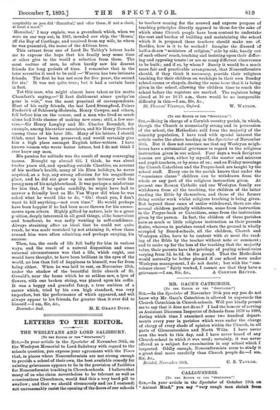[TO TEE EDITOR OP THE “SpEcnTox."] SIR,—Being in charge of
a Cornish country parish, in which, though the Church is numerically strong and in possession of the school, the Methodists still form the majority of the minority population, I have read with special interest the article under the above heading in the Spectator of November 30th. But it does not convince me that my Wesleyan neigh- bours have a substantial grievance in regard to the religious instruction given in our school. Four days a week Scripture lessons are given, either by myself, the master and mistress and pupil-teachers, or by some of us ; and on Friday mornings the Church Catechism and the Prayer-book are taught by the school staff. Every one in the parish knows that under the "conscience clause" children can be withdrawn from the whole or any part of the religious instruction given. At present one Roman Catholic and one Wesleyan family are withdrawn from all the teaching, the children of the latter reading the Bible by themselves, and those of the former doing secular work whilst religious teaching is being given. But beyond these cases of entire withdrawal, there are also several children partially withdrawn, some from instruction in the Prayer-book or Catechism, some from the instruction given by the parson. In fact, the children of these parishes have as much or little religions instruction as their parents desire, whereas in parishes round where the ground is wholly occupied by Board-schools, all the children, Church and Wesleyan alike, have to be content with at most the read- ing of the Bible by the teacher without note or comment ; and to make up for the loss of the teaching that the majority value, their parents have the privilege of paying school-rates varying from 3d. to 6d. in the pound. That the Methodists would naturally be better pleased if our school were under Wesleyan management, I do not doubt ; but with the "con- science clause" fairly worked, I cannot see that they have a






















































 Previous page
Previous page